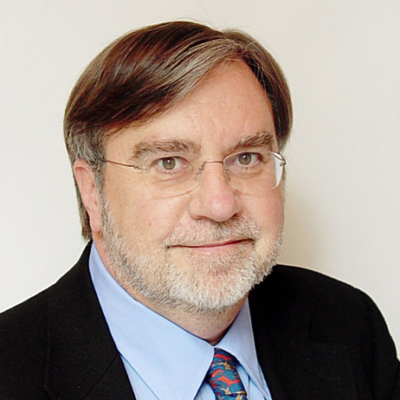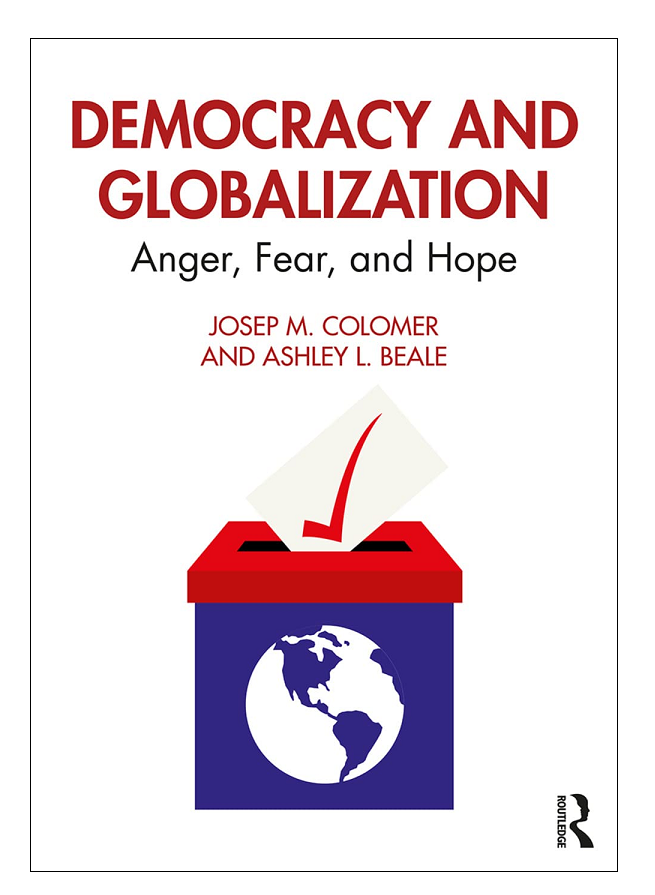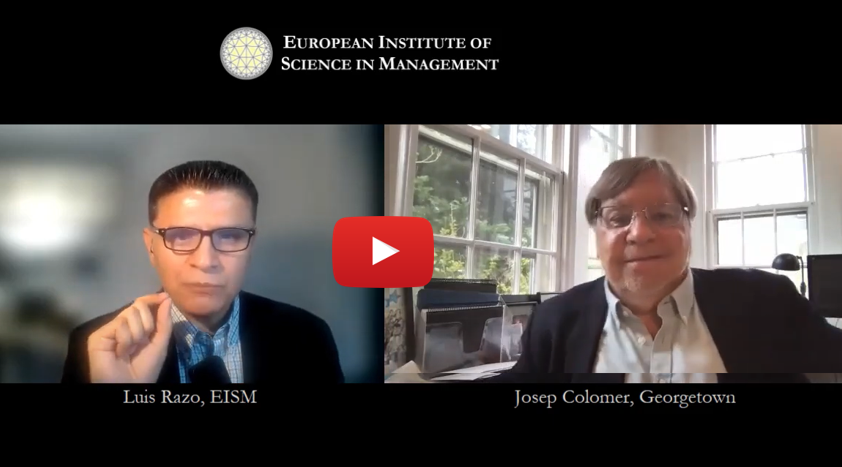
Josep M. Colomer is a scholar, professor and author in political science and political economy. He is currently a Researcher at the Institute of Political and Social Studies in Barcelona and at the School of Foreign Service of Georgetown University, in Washington, DC. He has published theoretical and comparative studies of voting and elections, political institutions and institutional change, and European politics. He was a Fulbright Scholar at the University of Chicago, a research professor at the Higher Council for Scientific Research (CSIC), in Barcelona, and has taught at numerous institutions, including the Autonomous University of Barcelona, the Pompeu Fabra University, the Institut d’Etudes Politiques SciencesPo in Paris, the University of Bristol, FLACSO and CIDE in Mexico city, and New York University. In this exchange, we talk to Prof. Colomer about his most recent book, Democracy and Glaobalization: Anger, Fear, and Hope. We also ask him to explain the Spanish and Catalan origins of social choice theory and artificial intelligence.
* The following text has been excerpted from the full video interview.

Minute 2:22 Can you tell us about your career and the trajectory that took you from your native Barcelona to where you are now in Washington, D.C.?
Well, I grew up in a dictatorship in Spain so the options were limited, but I always had in mind that the place to be was America so I graduated economics in Barcelona and then I went as a Fulbright scholar to the university of Chicago in the US, which changed my life and my vision of the world forever – the famous economists in Chicago but also the political scientists at the time that were challenged by this methodology. Following this leadership, I tried to use some economic tools in the analysis of political topics, which was innovative at the time, especially when I introduced game theory to explain political strategies, democratization, etc., which has been one of the mainstreams in political science in the last few decades.
Minute 4:14 How would you describe the role that econometrics, empirical testing and data-centered political analysis has played in your career?
So, for a long time, political studies were divided between, say, political philosophy, which was more or less abstract speculation and normative values and empirical data, especially by sociologists. I always remember the terrible advice of some colleagues to “let data speak”. Well, they don’t speak if you don’t make questions right. So regular science – we [political science] must be a regular science – is both. Form logical hypotheses, which must have theoretical support, and then use data and empirical observations to support those hypotheses, or reject those hypotheses, and make progress. The point is that every time you do one exercise of these it should be cumulative. So, the next time it is not valid that the new student or young graduate does the same question with different data. Because if the question has been answered, you have to start discussing whether that answer is still valid or not and make progress as a regular science. So that’s basically my obsession: empirically-grounded logical theory, so to speak.

Minute 6:30 Historically, democracy has been fraught with problems. Can you tell us what impact globalization is having on those historical problems with democracy?
The impact of globalization on democracy comes from the fact that many policy issues have enlarged their territorial scope, which makes them less manageable than they were by national democratic states. So nowadays many governments do not control many issues that they used to govern, like say communication because internet, but also trade or capital investments, migrations, not to speak of pandemics and climate crisis, which of course are global. So national states cannot govern as they used to and, actually, national sovereignty does not exist anymore. Because if you define sovereignty well, it means that the power to make final decisions on all issues within some borders, and in many of those issues there are no borders anymore. So then what happens? Politics becomes kind of a show, entertainment many times which is useless, and at the same time people become angry and frustrated and then they react against incumbents and against the traditional parties, as has happened in the last… at least since the financial crisis in 2008. So now what’s happening now in most democracies? Many governments have lost elections, re-elections. Some traditional governmental parties have disappeared. New parties have emerged, many of them with nationalist positions against the European union or against globalization. There is more fragmentation in parliament, it’s more difficult to make a political majority. So, in short, there is more political instability in national states, which has aggravated during the two years of pandemic, but the paradox is that at the same time, precisely because the origin of this crisis is international global issues, many policy issues are becoming similar, or overall the same, across countries, even independently of which party is in government. Because the same issues are everywhere, right? And there are not many other solutions that could scale to that large scope of the issue. So, you have domestic political instability and, at the same time more, international policy homogenization which calls for more global governance.
Minute 9:30 You write about multiple levels of democracy. What are those levels and what are some of the challenges of arriving to international democracy?
Well multiple levels mean that you have about three or four levels of government – local government, national government, and global government – but actually there are more because in Europe there is a continental government, so to speak. In most countries, there are between three and seven levels because there are also metropolitan areas, regions, etc. And then, each level of government makes decisions on different issues depending on the scale of efficiency of the issue that I mentioned before. None of these governments is sovereign in the in the sense that I mentioned before because they cannot make decisions on everything anymore.
So national governments must accept that they are not the central focus of decision making and there are many demands now for reallocation of powers from national states to local or sub-state level governments. But the main reallocation now is from national states towards the European union and towards international global institutions. The European union in the last few years has made a lot of progress in becoming stronger – rescue plan, issuing it’s own debt, controlling the national state budgets, etc. And even the pandemic has shown the need of more global coordination about rules for traveling, distribution of vaccines, etc., so that’s a way of considering national governments as the main core of politics to understand there are multiple levels each with different issues and none of them is absolutely sovereign on everything.

One of my books is still valid now, especially with the crisis in Ukraine, etc., is that most of the world is organized in a very large unions of classical imperial size. I like to call it “empires”, even though there are democratic empires and autocratic empires. But say the United States, the European Union, Russia, China, India, just to mention the largest five, they encompass about half of the world population. So half of the world population lives in five large political units and the rest, I mean more than 150 states, is in the other half. So, these empires, whether democratic or autocratic, have something in common which is different from the consolidated national states which is this: they don’t have fixed borders. They expand and contract as has happened always in history with every empire. So, the European union is still expanding because there is a lot of candidates to become members, but it contracted with Brexit. And Russia, of course, contracted very much 30 years ago and now is in revenge trying to expand this a little bit again, etc. And this can explain some conflicts because there are no fixed borders. If you remember, I mean everybody can remember, from Hollywood movies, the frontier in the west of the United States, when they were expanding, right, so territories that do not belong to any well-organized political structure, with a lot of violence and lawlessness, etc. This still exists and now I think the Eastern Europe crisis is about that. There’s no clear border and then it would be good to have more cushion between the empires in order to prevent direct confrontation.
Minute 22:16 You argue that Ramon Llull is the earliest precursor to what today can be considered social choice theory or voting theory. Please explain.

Ramón Llull was a great thinker in 13th century Majorca. He wrote in Latin as a scholar and in Catalan as a novelist, actually one of the very first novels in history. He tried to compile all knowledge of the time into a single system by using a kind of binary method and classifying everything in pairs: zero-one, zero-two, one-two, etc., like modern computer science or artificial intelligence, which is why they consider him a precursor of these disciplines. But I think at the time he was one of the greatest thinkers in Europe like Erasmus or DaVinci – those people who pretended to know everything about all knowledge at that time.
My study was about his contribution to voting rules which is a branch of his “general method”. The context for his concern was the emergence of majority rule to make collective decisions as it was being adopted at the time of the 13th century by both the Christian church for the election of bishops, abbots, abbesses, even popes and certain city republics, especially in northern Italy and south Florence, but also in some German territories. Before that, if you look at the Romans, etc., quality decisions were supposed to be by unanimity. I mean even by a dictator or whatever, or if people participate, there should be general agreement, whether by a acclimation, claps, raising on one’s feet, these kind of things.
Of course, on many occasions there was not a real unanimous agreement. I think moving from that to accept majority rule to make decisions which was Llull’s concern, especially in the church canon law and the German law, I think, sincerely, is one of the greatest achievements in human civilization because it’s something other animals don’t do. It is only human animals accept to consent and comply with collective decisions that we may not share just because there are more people in favor of them that are against it, right? So that’s a big step ahead in human civilization.
Llull’s genius idea was make majority rule viable was to transform a multiple candidate election into a series of two-candidate selections. So, comparing by pairs, A with C, A with D, then B with C, C with D, etc. — all in pairs. Then there will be a majority on every comparison because the only two candidates produce a majority and his idea is that the winner should be the one who won more times these pairs comparisons. So, the one who won a majority of majorities which seems persuasive to accept that as a majority winner. And then he used binary tables and diagrams, as he did for some of his other topics, which is why he is considered as precursor of computer science and artificial intelligence, which use these binary systems, but also of voting theory because he introduced a rational discussion about how different procedures may produce different winners, which is the best and which is the worst.
Minute 45:00 How can people follow your work?
Well, I have a blog which is easy to find, http://jcolomer.blogspot.com, and I have my personal website, www.josepcolomer.com, with all my publications and links to all of my activity.


